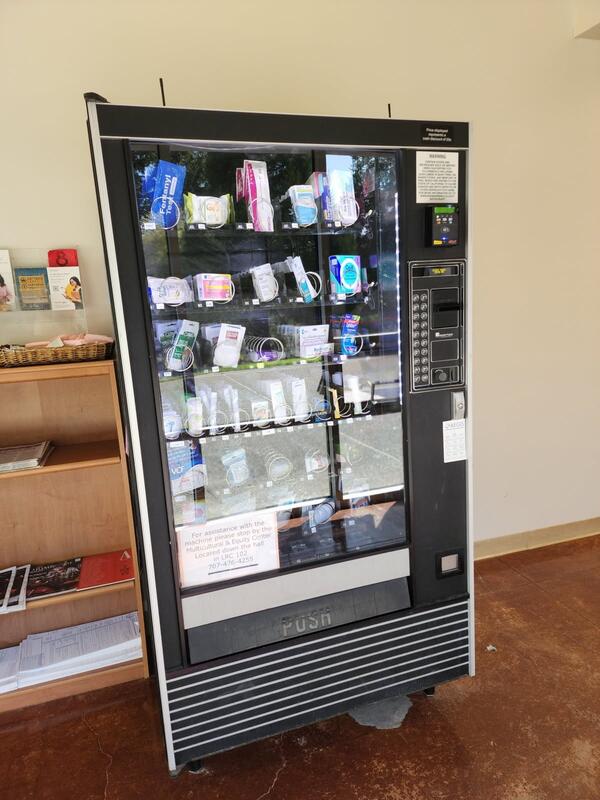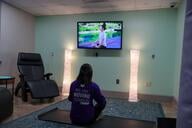You have /5 articles left.
Sign up for a free account or log in.

A wellness vending machine helps increase access to reproductive health products at College of the Redwoods.
ADragan/iStock/Getty Images Plus
According to a May 2024 Student Voice survey, roughly one in five community college students (19 percent) believe their institution should invest in wellness facilities or services to promote well-being. A recent pilot program across the state of California seeks to remove barriers to accessing health supplies for community college students.
The Wellness Vending Machine Pilot Program, a state-funded program established by Assembly Bill 2482, which passed in 2022, aims to make preventative care products more accessible to college students. The program provides funding for 18 colleges to address students’ physical health and overall academic success in a unique, lower-cost way: through vending machines that dispense everything from Band-Aids to birth control.
For some institutions, like College of the Redwoods, the vending machine is the primary source of personal care products on campus.
Community colleges in particular are often underresourced and limited in their ability to provide students with wraparound support services. A 2024 survey by the Richmond Federal Reserve of 80 community colleges in the District of Columbia, Maryland, North Carolina, South Carolina, Virginia and most of West Virginia found that only 3.8 percent of responding institutions offered on-site health services during the 2022–23 academic year. The greatest obstacle to offering such resources is funding.
Katrina Hanson, manager of retention, basic needs and well-being for the College of the Redwoods community college district in Central California, applied for the vending machine grant in July 2023 to address a service gap on the main campus in Eureka.
The College of the Redwoods closed its Eureka student health center in spring 2023, shifting from having a part-time nurse to instead offering tele–mental health services through TimelyCare. It also purchased three wellness vending machines: two for Eureka and one for one of its other two campuses, on the Hoopa Indian reservation.
“It’s not a complete substitute for in-person care,” Hanson said. “But it is more equitable for our students on our Hoopa [Klamath-Trinity Instructional City] and Crescent City [Del Norte Education Center] campuses, as well as all of our online students.”
How it works: The college set up the three wellness vending machines in August 2023, placing one in Eureka’s library and the other in a residence hall, as well as one on the Hoopa campus. The grant requires participating colleges to place vending machines in a central location that students can access at any time.
The requirements also outline the products that should be sold, including condoms, dental dams, menstrual cups, lubricants, tampons, menstrual pads, pregnancy tests and emergency contraception pills. College staff identify and supply the machines with other popular or needed supplies.

Eureka’s wellness vending machine is located in the library, which has the most hours of availability for students, allowing them to access it when they need various health supplies.
Katrina Hanson/College of the Redwoods
For example, when Eureka’s health center closed, Hanson asked which services were most popular. She learned that pregnancy tests and urinary tract infection tests were most commonly used, so she now ensures that the campus vending machines has those supplies available.
Other popular items are Band-Aids, which are free in the machine, and Benadryl, which is discounted.
The machines themselves are rented from a company that also handles snack machines around campus, so the college does not have to deal with maintenance or money collection. Grant funding will cover the machines for the five years of the pilot, but supplies are budgeted by the institution.
“We are trying to get it to be at least somewhat self-sustaining by trying out different items,” Hanson said. “The sexual health and menstrual health supplies are free or discounted, per our grant agreement. The other items we can offer at regular price to try to make some money to keep the project going.”
Survey Says
Inside Higher Ed’s Student Voice survey of college students found that about two-thirds of respondents (n=5,025) rated the variety and quality of campus health and wellness offerings as good or average; about 5 percent indicated they had poor resources. Numbers were similar for respondents at two- and four-year institutions.
Two birds, one machine: In addition to offering tailored health products for students, the vending machines also work as a resource hub, displaying informational posters in English and Spanish to equip learners with important information.
Poster content includes what to know about emergency contraception, how to use the opioid overdose–reversing drug Narcan/naloxone, sexual wellness education and how to provide feedback to the college about using the machine.
Rightsizing: Since setting up the machines, college staff have noticed that two machines (the one on the reservation campus and the one in the Eureka dorm) weren’t being used often, or students were only buying certain supplies. In the residence hall, for example, students only really wanted condoms. So campus leaders elected to downsize and just keep the one machine in the library, offering free supplies in other places instead.
This academic year, the most purchased items have been condoms, menstrual cups, fentanyl tests, Narcan, tampons and acetaminophen. Students also frequently purchase deodorant, energy gels, LiquidIV, lip balm, ibuprofen, pregnancy tests and cough drops.
So far, the machines haven’t been profitable, but staff pull supplies from the Basic Needs Center or local partners to keep costs low and continue to vary their offerings.
The college is planning to reopen its student health center following construction, so the vending machines will support students in the meantime, Hanson said.
Do you have a wellness intervention that might help others promote student success? Tell us about it.




